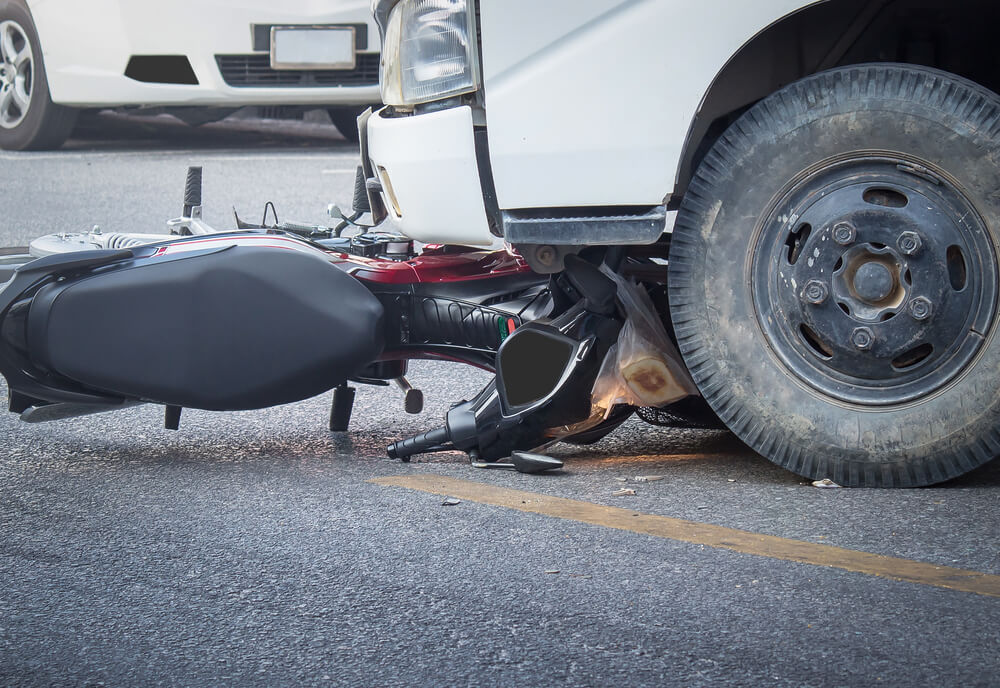You need evidence to support your claim if you want compensation for injuries you suffer in a truck accident. The evidence your personal injury lawyer collects could prove the truck driver or the trucking company or both caused the accident and help your lawyer calculate the losses and recover compensation for them.
Collecting and preserving evidence to support your truck accident claim involves a complicated and time-consuming process, especially while you try to recover from your injuries or deal with the loss of a loved one killed in a truck crash. A truck accident lawyer has the experience to investigate your accident, calculate your full damages, and negotiate with insurance companies to help you obtain fair compensation.
What Evidence Can I Use in a Truck Accident Claim?

State and federal laws that govern trucking companies and truck drivers require them to keep records of their operations. These records help regulators and law enforcement ensure truckers and their employers comply with the law. These records can also provide proof of fault after a trucking accident. A lawyer investigating a trucking accident may review records such as:
Truck Driver’s Hours of Service Logs
Truck drivers must record their hours on duty behind the wheel. The U.S. Department of Transportation now mandates that drivers use electronic logging devices, or ELDs, to record their on-duty/off-duty hours to ensure compliance with federal laws limiting their hours of service.
These logs may show that a truck driver had exceeded their limits when the accident occurred and may indicate the trucker's drowsy driving caused the crash.
It is more difficult to alter electronic records than the paper logs truckers once used, your lawyer may enlist the services of a forensic computer analyst to review ELD metadata for evidence of record tampering.
Truck Driver’s Pre-Trip Inspection Reports
The Federal Motor Carrier Safety Administration (FMCSA) requires all truck drivers to thoroughly inspect their tractor-trailers and cargo before their shift begins before departing. Federal regulations require trucking companies to complete a form verifying an inspection of all major vehicle parts and that the vehicle is in working order. The driver must fix or send the vehicle to a mechanic if they find any safety issues during a pre-trip inspection.
Truck Cargo/Freight Manifest
A cargo or freight manifest lists all the cargo on board the truck, including what it is, its characteristics, and its destination. The cargo/freight manifest may reveal that the cargo exceeded the truck's weight limit or that the trucking company or driver failed to properly balance or secure the cargo, and that led to your accident.
Inspection and Maintenance Records
FMCSA requires all trucking companies to retain all inspections, repairs, and maintenance records for each vehicle they control through ownership or lease for one year at the location where they house the truck and six months after the truck leaves the carrier's control through sale, trade-in, or otherwise. These inspection and maintenance reports may show that a tractor-trailer had an uncorrected safety issue that may have contributed to the accident.
Truck Event Data Recorder Logs
Federal law does not require trucks to carry event data recorders, but many do. Like black boxes on an airplane, these devices track vehicle data such as speed, acceleration, braking, steering, and air-bag deployment. Event data recorder logs could prove valuable when investigating and determining the cause of a trucking accident.
Truck Driver’s Employment and Driving Records
Inspecting the driver's employment history and driving records may bring past accidents or safety incidents to light. This evidence could establish negligent hiring on the part of a trucking company if the driver's records show a history of risky driving or other poor behaviors.
Drug/Alcohol Testing Following the Accident
FMCSA regulations prohibit commercial truck drivers from consuming alcohol within four hours of going on duty or operating a commercial vehicle. They also cannot have alcohol in the cab. After a truck accident, a trucker may undergo drug or alcohol screening. Your lawyer may ask to review the results of these tests. If positive, they serve as solid evidence of negligence on the part of the truck driver.
Cell Phone Usage Data
Your lawyer may review the truck driver’s cell phone usage data, which may indicate the trucker texted during the accident. If so, your lawyer can hold the driver accountable for the accident due to distracted driving.
Post-Accident Truck Inspection
Your attorney may have a mechanic inspect the damage the tractor-trailer sustained in the accident to determine whether a mechanical defect or inadequate maintenance on the part of the driver or carrier contributed to the crash. This inspection may reveal that headlights or tail lights were out or the tires were worn or bald.
What Evidence Should I Collect From the Scene of a Truck Accident?
You can help strengthen your truck accident case by collecting the following evidence following a trucking accident:
Photographs and Videos
If you can, take photos or video of the damage to your vehicle, the other vehicle, and any other property damaged in the accident. You should also take pictures of any injuries you sustained in the accident and any visible injuries sustained by other parties involved in the accident. Additionally, take pictures of the surrounding area, including traffic signals, road signs, and any other relevant features.
Witness Statements
If there were any witnesses to the accident, get their names and contact information. You can ask them to provide a written statement or to record a video statement. Witness statements can help support your version of events and can be used to contradict any false claims made by the other party.
Police Reports
After an accident, you should contact local law enforcement so they can make a police report. Be sure to ask them how to obtain a copy of the report. The report will contain important information about the accident, including the date, time, and location of the accident, the names and contact information of all parties involved, and any witness statements that were collected. The police report may also contain information about any traffic violations or other factors that may have contributed to the accident.
Medical Records
If you suffered injuries in the accident, it's important to seek medical attention regardless of how minor your injuries may seem at the time. You will want your medical records to document your injuries and the treatment that you received. You can use these records to support your claim for damages and show the extent of your injuries. Be sure to keep all medical bills and receipts, as well as any other documentation related to your medical treatment.
What Evidence Should I Collect for My Truck Accident Case?
Your accident claim demands that the insurance company reimburse your accident-related losses. You need to show evidence of your damages to establish the value of your losses.
You should collect:
- Medical expenses, including bills, invoices, or receipts for medical treatments
- Pay stubs or income statements that establish any income lost due to time off from work or the need to go part-time or on light duty due to your injuries
- Medical records and photos that establish the extent of your injuries
- Bills or estimates from the auto shop and photos that show the damage to your vehicle
- A diary or journal that documents the physical pain and emotional distress, physical limitations, or diminished quality of life caused by the accident or your injuries
- Any correspondence with the trucking company or its insurance provider, including date and time of the communication and what the conversation entailed
What Compensation Can I Receive in a Truck Accident Case?
You may receive various compensation for your truck accident. What and how much you receive depends on your accident and the damages you suffered.
Some common types of damages you may seek compensation for in a truck accident claim include:
- Medical expenses: You can typically seek compensation for current and future medical expenses related to injuries sustained in the accident. This includes hospital bills, doctor visits, surgeries, medication, rehabilitation, and other necessary medical treatments.
- Property damage: If the accident damages your vehicle or other property you may recover compensation for the cost of repairs or the fair market value of your property if the insurer deemed it a total loss.
- Lost income: If your injuries caused you to miss work, you may recover compensation for the income you lost during your recovery. Additionally, if the truck accident permanently impaired your ability to earn a living, you may seek compensation for future loss of earning capacity.
- Pain and suffering: You may recover compensation for physical pain, emotional distress, and mental anguish resulting from the truck accident and your injuries. Your settlement or lawsuit will base this subjective compensation on the severity and impact of your injuries.
- Disability and disfigurement: If the accident caused a permanent disability or disfigurement, such as the loss of a limb or severe scarring, you may recover additional compensation to account for the long-term effects on your quality of life.
- Loss of consortium: In certain cases, if the injuries from the truck accident hurt your relationship with your spouse or partner, they may seek compensation for the loss of companionship, affection, and support.
- Funeral and burial expenses: If you lost a loved one in a trucking accident, you may recover compensation for their funeral and burial or cremation costs.
How Can a Truck Accident Lawyer Help With My Claim?
If you retain a lawyer to handle your truck accident claim, they will use their knowledge and resources to gather evidence to get you the maximum compensation for your losses.
A lawyer can:
- File preservation orders with the trucking company or driver to secure evidence such as inspection reports or trucking logs
- Identify all liable parties
- Hire accident reconstruction, medical, engineering, and financial experts to provide testimony to support your claim
- Determine the full extent and value of your losses
- Negotiate with insurance companies for an accident settlement
- File your case in civil court within Florida’s statute of limitations
- Represent you in court and advocate on your behalf should you need to file a truck accident lawsuit

Talk to a Truck Accident Lawyer Today
A personal injury lawyer should understand the laws and regulations that govern truck drivers and trucking companies and have the experience and track record you need to recover full compensation in your truck accident case. Contact a personal injury attorney in Miami today for your free consultation and case evaluation.